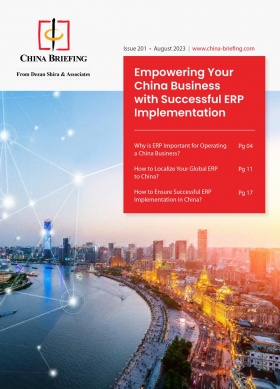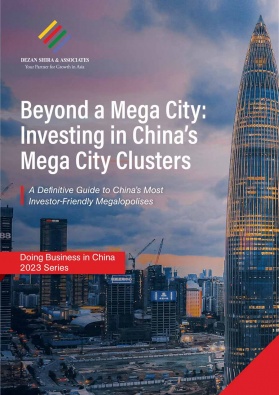China Releases Three-Year Action Plan for Metaverse Industry Development
China’s new action plan provides for the comprehensive and strategic development of its metaverse industry. Important objectives include stimulating economic growth, job creation, and innovation-led application of intelligence technologies across industries.
On September 11, 2023, China’s Ministry of Industry and Information Technology (MIIT) along with other four departments unveiled the ambitious Three-Year Action Plan for the Industrial Innovation and Development of the Metaverse (2023-2025) (hereinafter referred to as the “action plan” or “plan”).
This document outlines China’s visionary approach to metaverse industry development, with a focus on establishing “three to five industrial clusters” that revolve around emerging technologies. These clusters will serve as central hubs, driving innovation and governance structures within the realm of the next-generation internet, characterized by immersive three-dimensional spaces.
Indeed, the action plan, spanning the period from 2023 to 2025, underscores the versatile application of the metaverse across various sectors, including but not limited to home appliances, automotive, and aerospace industries. Furthermore, traditional manufacturing sectors, such as steel and textiles, can harness related technologies to optimize critical processes, including scheduling and material calculations, thereby enhancing their overall production procedures, as articulated in the plan.
In this article, we delve into the proposals included in the action plan, exploring its implications for China’s metaverse industry and its broader impact on the global digital landscape.
Highlights from the action plan
Objectives
The action plan outlines a comprehensive framework encompassing various components that collectively drive the development of the metaverse industry in China.
At its core, the plan introduces five key tasks, which serve as the pillars of its strategy:
- Building advanced metaverse technologies and industrial systems: This task emphasizes the integration and innovation of critical technologies like artificial intelligence, blockchain, cloud computing, and virtual reality within the metaverse landscape. It places a strong focus on advancing key technologies, including intelligent generation algorithms, distributed identity authentication, and data asset circulation. Additionally, it seeks to develop fundamental software components, such as metaverse-specific operating systems and middleware, contributing to the creation of a unified metaverse development platform.
- Cultivating a three-dimensional and interactive industrial metaverse: Here, the plan envisions the nurturing of a thriving ecosystem for three-dimensional interactive industrial metaverse applications. This involves the development of technologies related to real-time simulations, precise physical modeling, cloud-based modeling and simulation, data-driven hybrid modeling, and collective intelligent optimization simulations. The plan also emphasizes the importance of establishing specialized knowledge repositories for specific industries and processes.
- Creating immersive interactive digital life applications: This task focuses on the creation of immersive digital experiences for daily life. It aims to push the boundaries of sensory interaction technologies, including gestures, eye-tracking, head tracking, and motion capture.
- Establishing comprehensive industrial support: The action plan recognizes the need for robust support structures across various dimensions. It highlights the importance of advancing network and computing technologies, such as 5G-A/6G, gigabit optical networks, FTTR, high-speed wireless LAN, satellite internet, and cloud-network integration. Additionally, it emphasizes the acceleration of breakthroughs in high-performance computing, heterogeneous computing, intelligent computing, quantum computing, and neuromorphic computing. The objective is to promote the coordinated development of cloud and network infrastructure.
- Constructing a secure and trustworthy industrial governance system: This task underscores the critical aspect of security and trust within the Chinese metaverse ecosystem. It advocates for balanced development and proactive policy guidance and standardization efforts to establish a robust metaverse governance framework.
In addition to these tasks, the action plan also introduces fourteen specific measures, each tailored to address unique aspects of metaverse development.
Major initiatives
The plan lays the groundwork with four major initiatives that span key technological enhancements, ecosystem cultivation, industrial empowerment, and foundation strengthening.
Technology advancement
The action plan addresses the development bottlenecks in China’s metaverse industry, such as weak core technologies, limited product diversity, and a relatively small industrial scale. It proposes further strengthening the integration and innovation of technologies like artificial intelligence, blockchain, cloud computing, and virtual reality within the metaverse.
In particular, the plan emphasizes accelerating the development of key technologies, intensifying research and innovation in basic software and hardware, and achieving breakthroughs in critical areas like high-end electronic components and modeling software.
Industrial transformation
The action plan sets forth the primary goal of building an industrial metaverse and empowering the manufacturing industry. With this regard, it focuses on three key areas:
- The metamorphosis of critical industrial processes into the metaverse;
- The strategic positioning of industrial metaverses in key sectors; and
- The exploration of innovative industrial metaverse applications.
Industry support
The action plan outlines measures across three critical dimensions to establish comprehensive industry support. These are:
- Establishing a standard and regulatory framework for the metaverse industry: The plan underscores the necessity of creating a standardized and regulatory framework for the metaverse industry.
- Creating a trusted metaverse product evaluation and testing system: The plan emphasizes the establishment of a system for evaluating and testing metaverse products, ensuring their reliability and safety. Additionally, it seeks to enhance the protection of intellectual property rights within the metaverse.
- Developing advanced computing infrastructure: This involves the construction of new-generation computing resources that integrate cloud and edge computing, intelligent scheduling, and green and low-carbon technologies.
Integration of the Chinese metaverse with the global landscape
Notably, the action plan promotes proactive engagement in shaping international governance regulations and standards pertaining to the metaverse. Its primary objective is to achieve a “harmonious alignment between the global metaverse governance framework and domestic regulations.” Furthermore, it aspires to “nurture an inclusive, democratic, and transparent international governance system tailored specifically for the metaverse domain.”
Establishing the trajectory of China’s metaverse development
In the post-COVID-19 era, the metaverse has emerged as a transformative phenomenon, revolutionizing how people communicate, socialize, conduct business, and engage in trade, all free from the constraints of physical boundaries. Whether it is about creating a parallel, computerized version of reality, or enhancing the sensorial perception of human experience in the real world, both virtual reality (VR) and augmented reality (AR) technology represent the premises upon which China is strengthening its version of the metaverse—which is the natural next step for businesses and startups, especially in (but not limited to) the tech world.
The action plan is just the latest signal that the Chinese government is taking the metaverse and related technology very seriously, recognizing them as pivotal sectors for China’s future progress and acknowledging their potential to deeply impact both production processes and people’s daily lives.
This is also China’s first national-level action plan that directly addresses the development of the metaverse industry.
Several provincial authorities in China have also implemented their own strategies to foster metaverse growth, often with an emphasis on its potential to strengthen the economy and traditional sectors. For instance, in September 2022, Henan province, known for hosting the world’s largest iPhone manufacturing facility, unveiled its plan to cultivate a RMB 100 billion (approximately US$13.91 billion) metaverse industry by 2025. Their vision encompasses the establishment of distinct metaverse segments, including an “industrial metaverse,” “energy metaverse,” “education metaverse,” and “virtual human metaverse.” Additionally, in July 2022, the Shanghai government announced its plan to create a dedicated industry fund valued at around RMB 10 billion (US$1.42 billion) to support metaverse development initiatives.
In November 2022, the Chinese government had previously released another plan for development of virtual reality and related industries (thus, including the metaverse), setting a target of expanding the mixed reality (MR) industry to RMB 350 billion (approximately US$47.8 billion) by 2026.
All in all, these initiatives signify the Chinese government commitment to embracing and supporting the transformative potential of the metaverse, both on a central and local level.
The role of the metaverse in China’s economic landscape
China’s metaverse market is poised to reach a staggering US$12.6 billion in 2023, with a projected compound annual growth rate (CAGR 2023-2030) of 31.93 percent between 2023 and 2030.
As exemplified by the release of the action plan, the concept of the metaverse, once confined to the realms of science fiction, is now positioned at the forefront of China’s economic vision, ushering in a multifaceted transformation with profound implications for various sectors of the economy.
Indeed, traditionally reliant on manufacturing and exports, China sees the metaverse as an avenue for diversifying its economic landscape. By cultivating metaverse-related industries, the nation aims to reduce its dependence on traditional sectors, fostering new opportunities for economic expansion.
With reference to job creation and skills development, as China’s metaverse industry promises to be a prolific generator of jobs—spanning roles like software developers, content creators, hardware manufacturers, innovators and entrepreneurs, and virtual architects.
As such, the Chinese metaverse could catalyze digital transformation across traditional and frontier technology domains. Depending on the outcomes and their scope of usage, businesses will need to adapt and integrate new digital applications and technologies into their operations to achieve greater efficiency, reduce costs, and stay competitive.
Lastly, as highlighted in the action plan, consumer engagement takes on entirely new dimensions within the metaverse. Retail, entertainment, education, and social interactions undergo a renaissance within virtual realms. By harnessing the metaverse’s potential, businesses can craft immersive, personalized experiences for consumers, fostering deeper engagement and loyalty. This is particularly true for e-commerce and virtual marketplaces.
Key takeaways for businesses
As China charts an ambitious course to develop its metaverse industry, there are significant implications for businesses and investors keen on tapping into this fast-paced digital realm. Indeed, one of the key aspects of the action plan is its focus on aligning metaverse product supply with real-world demands. This emphasis on meeting the needs of sectors such as social interaction, entertainment, and office applications offers a wealth of opportunities for companies looking to expand their metaverse-related offerings.
Expanding offerings and market presence
By enhancing metaverse entry points, virtual space application tools, and platforms, businesses can not only diversify their product portfolios but also extend their market presence into the rapidly growing metaverse market.
Companies operating in areas like social media, entertainment, and software development can leverage their expertise to create metaverse-compatible products and services that cater to a new generation of users seeking immersive digital experiences.
Nurturing innovation and growth
The action plan also places a strong emphasis on fostering the growth of market players within the metaverse ecosystem. This includes nurturing both leading metaverse companies and innovative small and medium-sized enterprises (SMEs).
For larger enterprises, the plan offers opportunities to leverage their resources and industry knowledge to become influential players in the metaverse space. Meanwhile, SMEs with groundbreaking ideas have the chance to find support and avenues for growth within the metaverse industry.
Pilot zones for metaverse application
In its bid to accelerate metaverse development, the action plan envisions the creation of pilot zones for metaverse innovation applications, technology parks, and industrial clusters dedicated to the metaverse. Companies situated in these zones can benefit from specialized infrastructure, collaborative opportunities, and a regulatory environment conducive to metaverse-related activities. This can significantly accelerate their development and enhance their competitiveness in the evolving metaverse landscape.
About Us
China Briefing is written and produced by Dezan Shira & Associates. The practice assists foreign investors into China and has done so since 1992 through offices in Beijing, Tianjin, Dalian, Qingdao, Shanghai, Hangzhou, Ningbo, Suzhou, Guangzhou, Dongguan, Zhongshan, Shenzhen, and Hong Kong. Please contact the firm for assistance in China at china@dezshira.com.
Dezan Shira & Associates has offices in Vietnam, Indonesia, Singapore, United States, Germany, Italy, India, Dubai (UAE), and Russia, in addition to our trade research facilities along the Belt & Road Initiative. We also have partner firms assisting foreign investors in The Philippines, Malaysia, Thailand, Bangladesh.
- Previous Article Germany’s H1 2023 FDI in China Remains Strong Despite “De-Risking” Strategy
- Next Article Shanghai and Beijing Take Crucial Step in Liberalizing Cross-Border Capital Transfer









